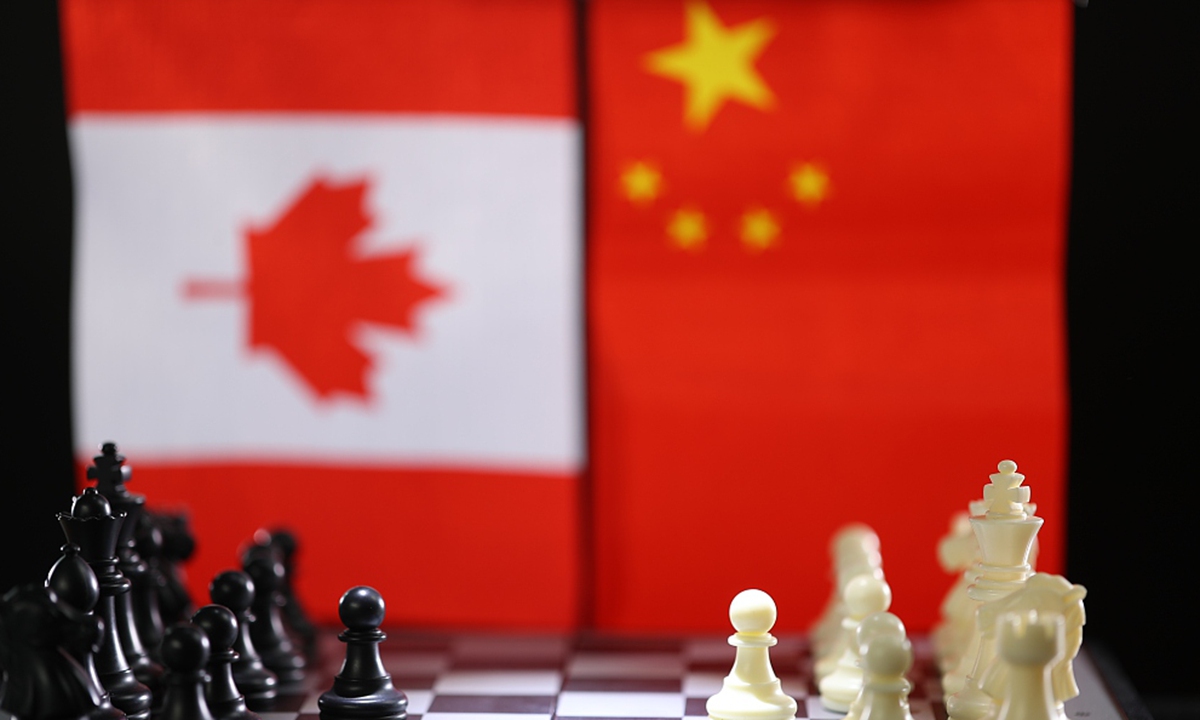Hypocritical for Canada to reflect on Chinese exclusion history while fueling China hostility

China Canada Photo: VCG
It is believed that Canada lacks sincerity in reflecting on its history of discrimination against Chinese people. The Canadian government introduced the Chinese Exclusion Act in 1923, which was the culmination of escalating racism and discriminatory policies targeting Chinese individuals that had been prevalent in Canada since the 19th century. On May 30, Steven Guilbeault, Minister of Environment and Climate Change and Minister responsible for Parks Canada, announced the designation of the Exclusion of Chinese Immigrants, commonly known as the Chinese Exclusion Act, as an event of national historic significance.
Yao Peng, deputy secretary-general of the Canadian Studies Center of the Chinese Academy of Social Sciences, told the Global Times that Canada's Chinese Exclusion Act is a notorious scar on its history. In the 24 years following the act's enactment, fewer than 50 Chinese individuals were permitted to enter Canada. This fact serves as evidence of the deep-seated historical racial discrimination targeting Chinese immigrants in Canada.
Chinese immigrants have historically faced exclusion and discrimination in Canada, and their fundamental rights have not been adequately protected. Reflecting on the history of Chinese exclusion shows that Canada has made some progress on the issue of racism. However, even though the situation for Chinese Canadians has improved, the current strained relations between China and Canada have sparked recurring waves of anti-China sentiment within the country, which has led to a lack of guarantee for the political rights and even the living environment of Chinese individuals in Canada.
"Canada continues to operate under a racial perspective that emphasizes white supremacy and ideological boundaries. Under this racial perspective, particularly against the backdrop of the technological and trade disputes between China and the US, Chinese Canadians have become the primary target of racial discrimination," Yao said.
He further argued that Canada's actions are hypocritical because they recognize historical events while simultaneously worsening the situation for Chinese Canadians and overseas Chinese. Astute observers have noticed a gradual deterioration in the systematic employment, promotion, and community relations of Chinese Canadians. In other words, there is an increasingly rampant systemic anti-Chinese mechanism within the Canadian government.
On one hand, some Canadian politicians and media have recently been promoting topics related to China, such as accusing China of interfering in Canada's elections and sensationalizing Chinese overseas "police stations" to fuel hostile sentiment against China. On the other hand, the Canadian government emphasizes the need to reflect on the history of the anti-Chinese act, which is aimed at catering to domestic Asian voters, including Chinese Canadians, noted Huang Zhong, an associate researcher at the Center for Canadian Studies, Guangdong University of Foreign Studies.
Currently, there is an anti-China force within Canada that stirs up issues related to Chinese Canadians domestically, exacerbating conflicts between Chinese Canadians and the rest of the Canadian society. This force aims to lead to a tougher stance by the Canadian government toward China as a means to appease criticism from the US and its allies, as well as certain voices within domestic society.
Such sensationalism of anti-Chinese sentiment can be harmful to Canada. Huang points out that this hostile sentiment toward China harms the relationship between Canada and China, making it difficult for bilateral relations to return to normal in the short term. Moreover, there is a high likelihood of a vicious cycle emerging.
Liu Dan, a research fellow at the School of International Relations, Guangdong University of Foreign Studies, shared a similar view that the opposition to Chinese Canadians within Canada is not only associated with racial discrimination but is also linked to the China-Canada relationship and certain political and diplomatic factors.
Recently, some Canadian politicians have endorsed and followed the US' anti-China policies, and anti-Chinese sentiment within Canadian society has reached a critical point. This has had extremely negative and detrimental effects on the China-Canada relationship, jeopardizing deep economic, trade, and industrial cooperation between the two countries. It has cast a dark shadow over the positive trajectory of industrial collaboration between China and Canada since the outbreak of the pandemic, and has hindered the rebuilding of political trust between the two nations.


